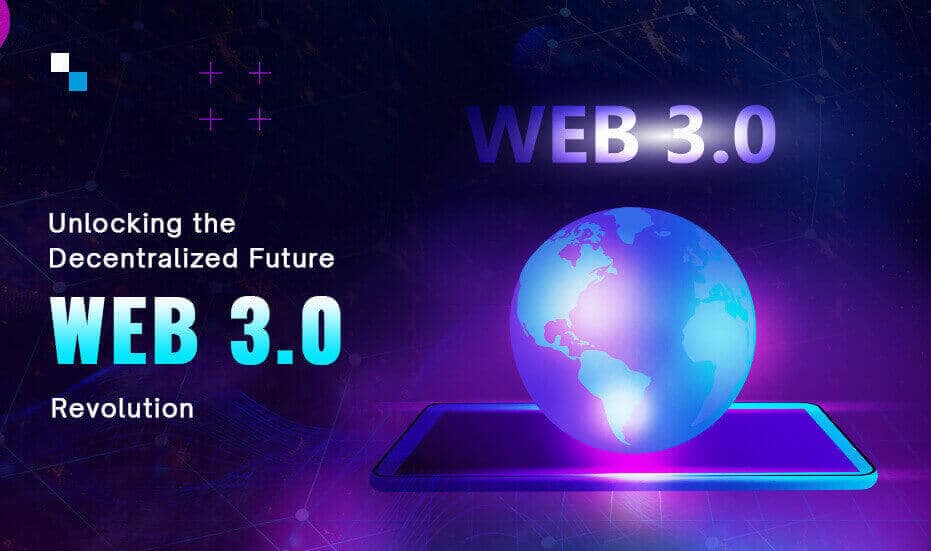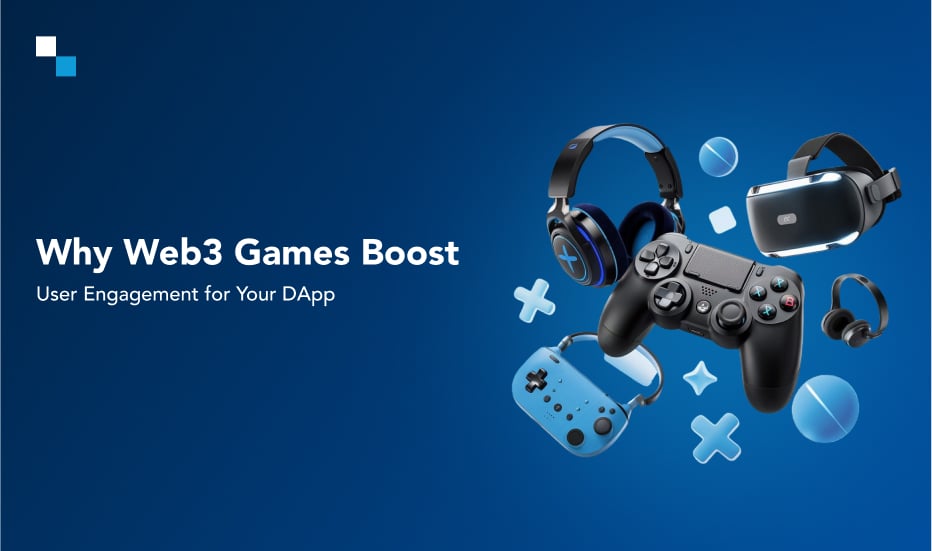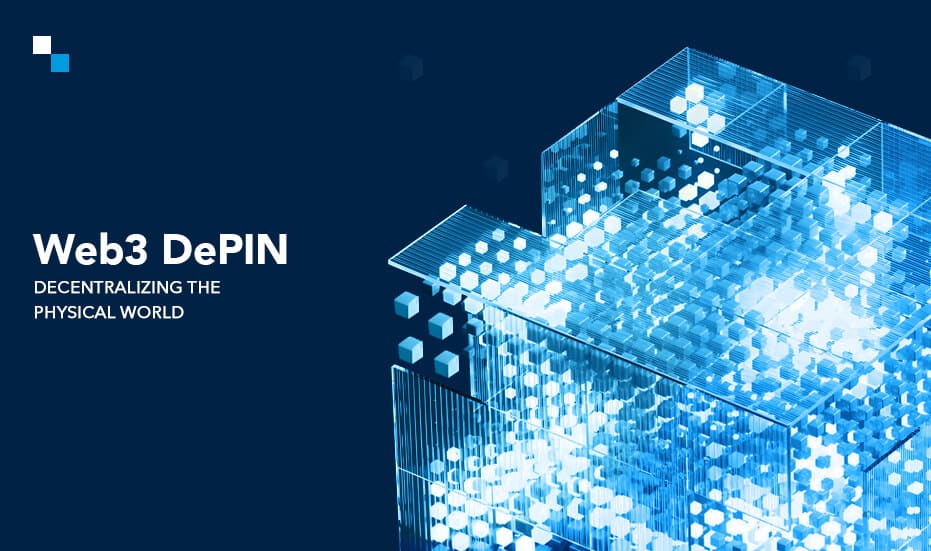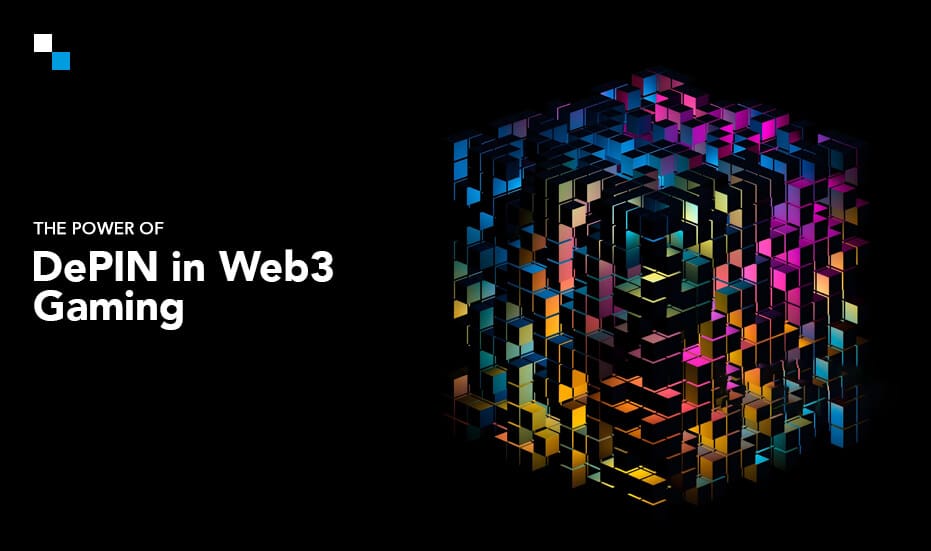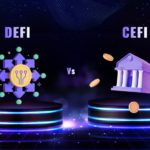The evolution of the internet has witnessed remarkable milestones, and now we stand at the cusp of a new era – Web 3.0. Web 3.0 represents a paradigm shift in the way we interact with the digital world, offering exciting possibilities for developers, businesses, and users alike. The global Web 3.0 market was valued at USD 2.2 billion in 2022 and is anticipated to increase at a CAGR of 44.5% to reach USD 81.9 billion by 2032.
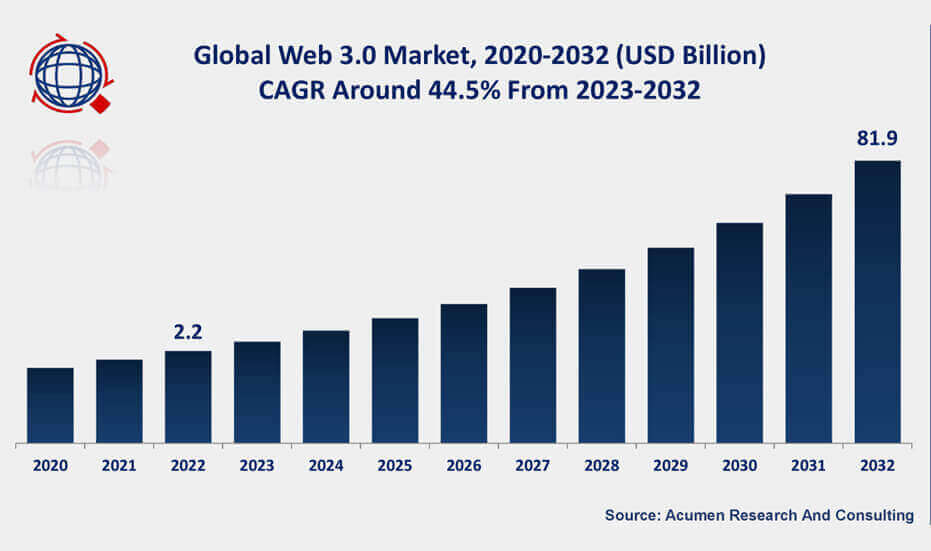
This article delves into the concept of Web 3.0 development, exploring its defining characteristics, potential applications, and the transformative impact it can have on various industries.
Key Features of Web 3.0
Web 3.0 development introduces several key features that set it apart from its predecessors:
- Decentralization
Web 3.0 leverages blockchain technology to create decentralized platforms and applications, eliminating the need for intermediaries and enhancing security, transparency, and user control.
- Interoperability
Web 3.0 aims to create an interconnected ecosystem where data and services can seamlessly communicate and interact across platforms, devices, and applications.
- Machine Learning and AI
A Web 3.0 Developer can integrate machine learning and AI technologies to process, analyze, and derive meaningful insights from vast amounts of data, enabling personalized and intelligent experiences.
- Smart Contracts
Web 3.0 utilizes smart contracts, self-executing agreements built on blockchain, to automate and enforce trustless transactions, reducing reliance on traditional legal systems.
- Enhanced User Experiences
Web 3.0 focuses on delivering personalized and immersive experiences to users through technologies like virtual reality (VR), augmented reality (AR), and mixed reality (MR).

How to Choose the Right Web3 Development Agency?
Choosing the right web 3.0 developer is crucial to the success of your project. Here are some factors to consider when selecting a trained developer:
- Expertise in Web 3.0 Technologies
Look for developers who have a deep understanding of Web 3.0 concepts and technologies such as blockchain, decentralized systems, smart contracts, and decentralized finance (DeFi). They should be familiar with popular blockchain platforms like Ethereum, Polkadot, or Solana and have experience working with related tools and frameworks.
- Relevant Experience
Consider the developer’s previous experience in Web 3.0 development. Look for projects they have worked on, especially those that align with your specific requirements and industry. Ask for case studies or examples of their work to assess their capabilities and problem-solving skills in the Web 3.0 domain.
- Technical Skills
Evaluate the technical skills of web 3.0 developer, including proficiency in programming languages such as Solidity, Rust, or JavaScript. They should also be well-versed in smart contract development, decentralized application (dApp) development, and integrating Web 3.0 components into existing systems. Additionally, knowledge of related technologies like IPFS (InterPlanetary File System) and decentralized identity (DID) protocols can be valuable.
- Understanding of Security Best Practices
Web 3.0 applications deal with decentralized networks and digital assets, making security a critical aspect. Ensure that the Web3 Development Agency has a good understanding of security best practices in the Web 3.0 space, including secure coding practices, vulnerability assessments, and the implementation of necessary security measures like encryption and access controls.
- Knowledge of Web 2.0 Development
Although Web 3.0 represents a paradigm shift, it is still essential to have a solid foundation in Web 2.0 development. A developer who understands traditional web technologies and frameworks can effectively integrate Web 3.0 components into existing systems and ensure a smooth user experience.
- Community Involvement
Web 3.0 development is closely tied to a vibrant and active developer community. Look for developers who actively participate in relevant communities, contribute to open-source projects, or attend industry conferences and events. Their involvement demonstrates their commitment to staying updated with the latest trends and advancements in the Web 3.0 space.
- Communication and Collaboration
Effective communication and collaboration are vital for a successful development process. Choose a developer who can clearly communicate complex technical concepts, actively listen to your requirements, and provide valuable insights. They should be able to work collaboratively as part of a team, adapt to changing project needs, and provide regular updates on progress.
- Portfolio and Client References
Request a portfolio or list of previous projects from the developer and review their quality and diversity. Additionally, ask for client references and reach out to them to gather feedback on the developer’s reliability, professionalism, and ability to deliver projects on time and within budget.
- Problem-Solving and Creativity
Web 3.0 developer can help tackle complex problems and find innovative solutions. Assess the developer’s problem-solving skills, ability to think critically, and creativity in finding unique solutions. Look for a Web3 Development Agency that can bring fresh ideas to the table and offer insights on how to leverage Web 3.0 technologies effectively for your specific project.
- Scalability and Future-Proofing
Consider the developer’s approach to scalability and future-proofing. Web 3.0 applications are expected to handle large-scale operations and evolving technology standards. Ensure that the developer has strategies in place to design and develop scalable solutions that can adapt to future advancements in the Web 3.0 ecosystem.
Applications of Web 3.0
Web 3.0, with its decentralized and intelligent nature, has the potential to transform various industries and domains. Here are some key applications of Web 3.0:
- Decentralized Finance (DeFi)
Web 3.0 enables the creation of decentralized financial systems that operate without intermediaries. DeFi platforms built on blockchain technology provide peer-to-peer lending, borrowing, and trading, as well as automated market-making and yield farming. These platforms offer greater financial inclusivity, transparency, and security, disrupting traditional financial systems.
- Healthcare
Web 3.0 empowers patients with control over their health data by leveraging blockchain for secure and interoperable data exchange. It enables personalized medicine, telemedicine, and AI-powered diagnostics. Patients can securely share their medical records with healthcare providers, ensuring better care coordination and improved healthcare outcomes.
- Supply Chain and Logistics
Web 3.0 development enhances supply chain management by leveraging blockchain’s transparency, immutability, and smart contract capabilities. It enables end-to-end traceability, provenance verification, and real-time monitoring of goods. This improves supply chain efficiency, reduces fraud, ensures ethical sourcing, and strengthens trust between stakeholders.
- Content Creation and Intellectual Property
Web 3.0 developer can introduce new models for content creation, distribution, and monetization. Artists, writers, musicians, and developers can directly engage with their audience through decentralized platforms, bypassing traditional intermediaries. Smart contracts can ensure fair compensation, copyright protection, and transparent royalty distribution.
- Social Media and Digital Identity
Web 3.0 offers decentralized social media platforms that prioritize privacy, data ownership, and user control. Users can have complete ownership of their digital identities, selectively share data, and control their online presence. Social media interactions can be mediated by smart contracts, enabling transparent and secure engagement.
- Internet of Things (IoT)
A seasoned Web3 Development Agency integrates IoT devices, allowing seamless communication, data sharing, and automation. Decentralized IoT platforms enable secure device interactions, data integrity, and privacy. This opens up possibilities for smart homes, smart cities, and interconnected ecosystems where devices autonomously interact and transact with each other.
- Education and E-Learning
Web 3.0 development can revolutionize education by enabling personalized and adaptive learning experiences. Intelligent algorithms, machine learning, and AI-powered tutoring systems can provide tailored educational content, assessments, and feedback. Blockchain-based credentialing systems can enhance the validation and verification of educational achievements.
- Governance and Voting Systems
Web 3.0 enables decentralized governance models, where decision-making processes can be transparent, auditable, and inclusive. Blockchain-based voting systems ensure secure and tamper-proof elections, reducing the risk of fraud or manipulation.
- Energy and Sustainability
Web 3.0 can facilitate peer-to-peer energy trading, decentralized grid management, and efficient resource allocation. Blockchain and smart contracts enable the creation of energy marketplaces, incentivizing renewable energy production and consumption, and promoting sustainability.
- Gaming and Virtual Reality
Web 3.0 developer can help create decentralized gaming platforms, where players have true ownership of in-game assets and can trade them freely. Virtual reality (VR) and augmented reality (AR) technologies can create immersive and interactive gaming experiences, blurring the boundaries between the digital and physical worlds.
Conclusion
Want to start your Web 3.0 development journey but lack rich experience? You can select a Web 3.0 development professional who possesses the right expertise, experience, and skills to meet your project requirements. You can do it with the help of Antier, the ace Web3 Development Agency. Connect today!
